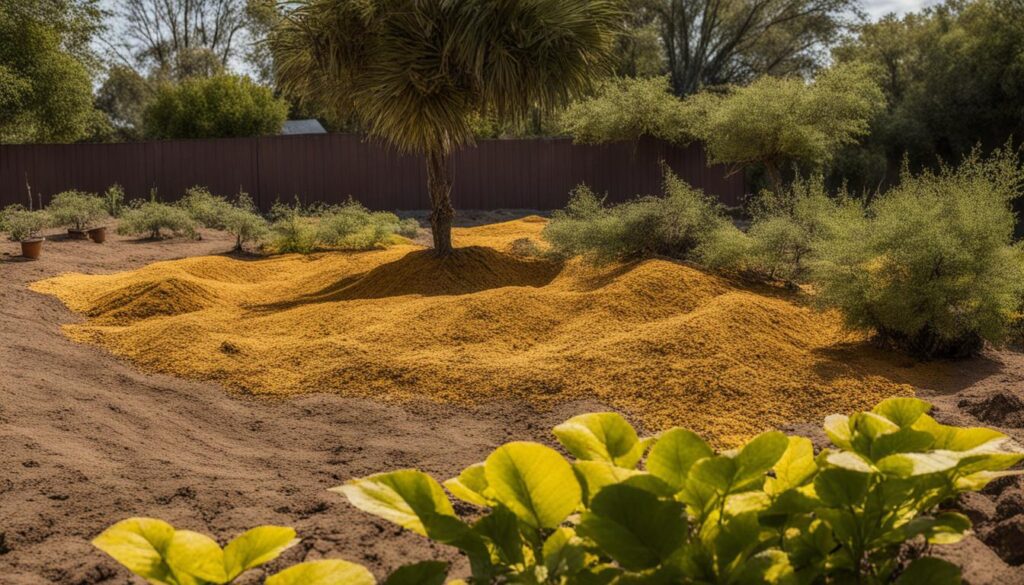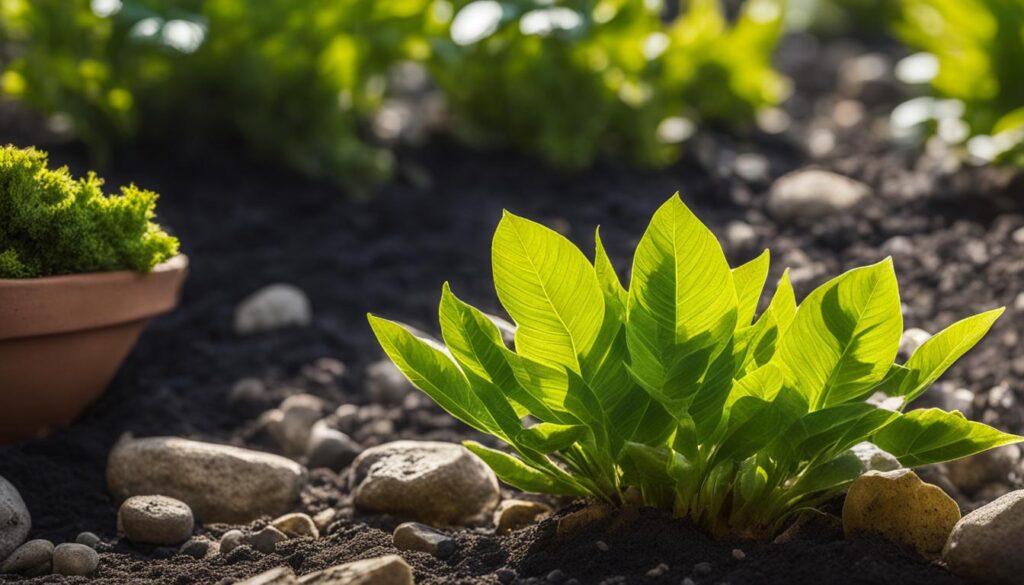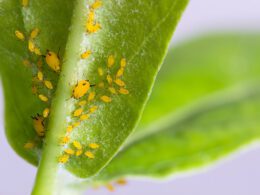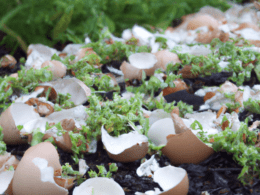Are you wondering whether sulfur is beneficial for your garden? Sulfur is an essential mineral that plays a crucial role in plant growth. It aids in the production of enzymes, proteins, and amino acids, which are fundamental building blocks for healthy plant development. Furthermore, sulfur can help adjust soil acidity to create a more suitable environment for certain plants. Let’s explore the importance of sulfur in the garden and how you can incorporate it into your gardening routine.
Post Summary
- Sulfur is essential for plant growth as it helps in the production of enzymes, proteins, and amino acids.
- It can also raise soil acidity and create a more suitable environment for specific plants.
- Sulfur deficiency in soil can lead to stunted growth, poor crop yield, and yellowing of new leaves.
- You can add sulfur to your garden through compost, sulfate-based fertilizers, or sulfur-rich materials.
- It is important to test the soil for deficiencies and adjust the sulfur content accordingly.
What is Sulfur and Why is it Important for Plant Growth?
Sulfur is a naturally occurring element that plays a vital role in the growth and development of plants. It is essential for the production of enzymes, proteins, and amino acids, which are fundamental building blocks for healthy plant growth. Enzymes are responsible for various biochemical reactions in plants, while proteins and amino acids are critical components of plant cell structure and function.
Sulfur is found in various natural sources, such as volcanic areas, hot springs, and decaying organic matter like compost and manure. These sources release sulfur into the soil, where plants can absorb it through their roots. Additionally, plants can also take in sulfur from the atmosphere, particularly in the form of sulfur dioxide during respiration.
The presence of sulfur in plants contributes to their overall health and resilience. It helps in improving soil structure, enhancing nutrient availability, and increasing resistance to pests and diseases. Furthermore, sulfur contributes to the flavor of certain plants, such as mustard, onions, and garlic, enhancing their taste and culinary value.
Sulfur is a crucial element for plant growth, as it is involved in the production of enzymes, proteins, and amino acids. It supports healthy plant development, improves soil quality, and enhances the overall health and flavor of plants.
Functions of Sulfur in Plant Growth
| Functions | Explanation |
|---|---|
| Enzyme production | Sulfur is a component of various enzymes that play a role in plant metabolism and biochemical reactions. |
| Protein synthesis | Sulfur is necessary for the formation of proteins, which are essential for plant cell structure and function. |
| Amino acid production | Sulfur is required for the synthesis of amino acids, the building blocks of proteins and plant hormones. |
| Soil improvement | Sulfur enhances soil structure, promotes nutrient availability, and aids in proper water drainage. |
| Pest and disease resistance | Plants with sufficient sulfur levels are better equipped to fend off pests and diseases. |
| Flavor enhancement | Sulfur contributes to the characteristic taste and aroma of certain plants. |
Ensuring an adequate supply of sulfur is essential for maintaining optimal plant growth and overall garden health. In the following sections, we will explore how sulfur can be used to adjust soil acidity, identify and resolve sulfur deficiencies, and implement effective methods to add sulfur to your garden.
Sulfur and Soil pH
Sulfur plays a significant role in adjusting soil pH, which can greatly impact plant growth and health. Soil pH refers to its acidity or alkalinity and is measured on a scale from 0 to 14, with 7 being neutral. Most plants thrive in a slightly acidic to neutral pH range of 6.5 to 7.5. However, certain plants, such as blueberries and azaleas, prefer more acidic environments with a pH level of 4.5 to 5.5.
Adding sulfur to the soil is a common method of lowering the pH and creating a more suitable environment for acid-loving plants. When sulfur is added to the soil, it undergoes a chemical reaction that produces sulfuric acid, effectively lowering the pH level. This acidity allows plants to access essential nutrients more easily, improving their overall growth and development.
It’s important to note that adjusting soil pH with sulfur is a gradual process that requires patience and monitoring. The amount of sulfur required depends on factors such as the initial soil pH, desired pH level, and soil type. Conducting a soil test is crucial to determine the current pH and sulfur levels, helping you make informed decisions about the amount of sulfur to add.
| Soil pH Level | Acidity/Alkalinity | Suitable Plants |
|---|---|---|
| Below 7 | Acidic | Blueberries, Azaleas |
| 7 | Neutral | Most plants |
| Above 7 | Alkaline | Lavender, Lilacs |
To add sulfur to your garden, you can use several methods. One option is to incorporate sulfur-rich materials, such as elemental sulfur or gypsum, into the soil. These materials slowly release sulfur over time, gradually lowering the pH. Another approach is to use sulfate-based fertilizers that contain sulfur. These fertilizers provide a concentrated source of sulfur, allowing for more immediate results.
Remember to follow the recommended guidelines for sulfur application and always conduct a soil test before making any adjustments. By carefully managing soil pH with sulfur, you can create an optimal growing environment for your plants and ensure their healthy development.
Identifying a Sulfur Deficiency in Your Garden
A sulfur deficiency in plants can have negative effects on their growth and overall health. By learning how to identify the signs of sulfur deficiency, you can take the necessary steps to address the issue and promote healthy plant development.
One of the most common indicators of a sulfur deficiency is stunted growth. If your plants aren’t growing as expected or are smaller in size compared to healthy plants of the same variety, it could be a sign of insufficient sulfur levels. Additionally, poor crop yield is another symptom to watch out for. If your fruits, vegetables, or flowers aren’t producing as abundantly as they should, a lack of sulfur could be to blame.
Another telltale sign of a sulfur deficiency is yellowing leaves, especially on newer growth. When plants don’t receive enough sulfur, their leaves may turn yellow and show signs of chlorosis. This occurs because sulfur is necessary for the production of chlorophyll, the pigment responsible for giving plants their green color. Without enough sulfur, plants struggle to produce adequate chlorophyll, leading to yellowing leaves.
To accurately diagnose a sulfur deficiency, it is recommended to conduct soil tests in various areas of your garden. Soil testing kits can be purchased from gardening stores or online. These kits will measure the sulfur content in your soil along with other essential nutrients. Once you have identified a sulfur deficiency, you can take appropriate measures to address it and improve plant growth and health in your garden.
Signs of a Sulfur Deficiency in Plants
| Signs of Sulfur Deficiency | Description |
|---|---|
| Stunted Growth | Plants are smaller in size and do not reach their expected height. |
| Poor Crop Yield | Fruits, vegetables, or flowers do not produce as abundantly as expected. |
| Yellowing Leaves | Newer leaves turn yellow, indicating chlorosis and a lack of chlorophyll production. |
Identifying a sulfur deficiency in your garden is crucial for maintaining healthy and thriving plants. By being proactive in monitoring the signs and symptoms, you can provide your plants with the necessary sulfur to support their growth and overall well-being.
3 Ways to Add Sulfur to Your Garden
Adding sulfur to your garden can be done in various cost-effective ways, providing your plants with the essential nutrient they need for optimal growth. Here are three effective methods:
1. Compost and Sulfur-Rich Materials
One way to add sulfur to your garden is by incorporating compost and sulfur-rich materials into the soil. Compost naturally contains sulfur as it decomposes, making it a valuable source of this essential mineral. Additionally, materials such as peat moss, pine needles, and sawdust can also be used as sulfur-rich amendments. These materials gradually release sulfur into the soil, providing a steady supply for your plants.
2. Sulfate-Based Fertilizers
Sulfate-based fertilizers are another convenient option for adding sulfur to your garden. These fertilizers contain sulfur in the form of sulfates, which can be readily absorbed by plants. Look for fertilizers labeled as “sulfate of potash,” “ammonium sulfate,” or “gypsum,” as they contain higher levels of sulfur. Follow the instructions on the fertilizer packaging to determine the appropriate application rate for your specific plants.
3. Elemental Sulfur
If you prefer a long-lasting sulfur amendment, elemental sulfur can be used. It needs to be applied well in advance, preferably six months to a year before planting. Elemental sulfur reacts with soil bacteria to convert into sulfuric acid, which gradually lowers the soil pH and increases sulfur availability. Before using elemental sulfur, it is crucial to conduct a soil test and determine the recommended application rate based on your soil’s current pH levels.
By incorporating sulfur into your garden through compost, sulfate-based fertilizers, or sulfur-rich materials, you can ensure your plants have access to this essential mineral for healthy growth and development.
Comparing Different Methods of Adding Sulfur to Your Garden
| Method | Pros | Cons |
|---|---|---|
| Compost and Sulfur-Rich Materials |
|
|
| Sulfate-Based Fertilizers |
|
|
| Elemental Sulfur |
|
|
Adding sulfur to your garden can provide numerous benefits, including enhanced plant growth and improved nutrient availability. Consider the specific needs of your plants and the current state of your soil when choosing the most suitable method for incorporating sulfur. By supplementing your garden with this essential mineral, you can create a thriving and healthy growing environment for your plants.
Tips for Maintaining Acid-Rich Soil
When it comes to creating and maintaining acid-rich soil in your garden, there are a few key strategies and practices that can help ensure optimal plant growth and health. Here are some tips to consider:
1. Add Mulch and Compost
Mulch and compost are essential for replenishing nutrients in the soil and helping to maintain a suitable pH level. Organic matter such as pine needles, oak leaves, and coffee grounds can be used as mulch to increase soil acidity. Compost, on the other hand, provides a rich source of organic nutrients that can support the growth of acid-loving plants.
2. Monitor pH Level
Regularly testing the pH level of your soil is crucial for maintaining optimal growing conditions. Acid-loving plants typically thrive in soil with a pH range of 4.5 to 5.5. By monitoring the pH level, you can make any necessary adjustments to ensure the soil acidity remains within the preferred range.
3. Choose Acid-Loving Plants
Selecting plants that are naturally adapted to acidic soil conditions can greatly contribute to the overall health and success of your garden. Acid-loving plants like hydrangeas, camellias, blueberries, and azaleas are well-suited to flourish in acid-rich soil environments. By choosing these plants, you can enjoy vibrant blooms and lush foliage.
By following these tips, you can create and maintain acid-rich soil in your garden, providing an ideal environment for acid-loving plants to thrive. Remember to regularly add mulch and compost, monitor the pH level, and select plants that are well-suited to acidic conditions. With proper care and attention, your garden will flourish with healthy, vibrant growth.
What Does Sulfur Do for Plants?
| Benefit | Description |
|---|---|
| Enzyme Production | Sulfur plays a crucial role in the formation of important enzymes in plants. Enzymes are essential for various biochemical processes within the plant, including nutrient uptake and metabolism. |
| Plant Proteins | Sulfur is a key component for the formation of plant proteins. Proteins are vital for plant growth, development, and defense mechanisms. They are involved in cell structure, enzyme function, and transportation of nutrients. |
| Nutrient Enhancement | Sulfur improves the availability of other essential nutrients in the soil, such as nitrogen and phosphorus. It helps plants utilize these nutrients effectively, promoting healthy growth and development. |
Sulfur is an essential nutrient for plants, as it has several important functions. It is involved in the production of enzymes that regulate various biochemical processes within the plant. These enzymes play a crucial role in nutrient uptake, metabolism, and overall plant health. Additionally, sulfur is a key component in the formation of plant proteins, which are necessary for growth, development, and defense against pests and diseases.
Furthermore, sulfur enhances the availability of other essential nutrients in the soil. It improves the uptake and utilization of nitrogen and phosphorus by plants, which are vital for healthy growth and development. By optimizing nutrient absorption and utilization, sulfur contributes to improved plant vigor, increased resistance to stress factors, and overall plant health.
“Sulfur is essential for the synthesis of enzymes and proteins in plants, which are fundamental to their growth and development. It also improves the availability of other essential nutrients, ensuring plants can efficiently utilize them for optimal health and productivity.”
Overall, sulfur plays a critical role in plant physiology, contributing to enzyme production, plant protein formation, and nutrient enhancement. Its presence ensures proper plant growth, development, and resilience to environmental stressors. By understanding the importance of sulfur and its impact on plant health, gardeners can make informed decisions to optimize the well-being and productivity of their plants.
Sulfur Sources for Plants
Sulfur is an essential nutrient for plants, and there are various sources from which they can obtain it. These sources include fertilizers, manure, the atmosphere, and minerals found in the soil.
Fertilizers are a common source of sulfur for plants. Many fertilizers contain sulfur as a nutrient, ensuring that plants receive an adequate supply of this essential element. It is important to choose fertilizers that are specifically formulated for the type of plants you are growing and follow the recommended application rates.
Manure is another organic source of sulfur. Animal manure, such as cow or poultry manure, contains sulfur that can be absorbed by plants as they break down the organic matter. Adding manure to the soil not only provides sulfur but also improves soil fertility and structure.
In addition to fertilizers and manure, plants can also obtain sulfur from the atmosphere. During respiration, plants take in sulfur dioxide from the air and convert it into a usable form. This atmospheric sulfur contributes to the sulfur content in plants and helps maintain their health.
| Sulfur Sources | Description |
|---|---|
| Fertilizers | Commercially available fertilizers that contain sulfur as a nutrient. |
| Manure | Animal manure, such as cow or poultry manure, that breaks down and releases sulfur into the soil. |
| Atmosphere | Plants take in sulfur dioxide from the air during respiration and convert it into a usable form. |
| Minerals | Sulfur is present in certain minerals found in the soil, which release sulfur as they break down. |
Lastly, some minerals found in the soil contain sulfur. These minerals gradually release sulfur as they break down, providing a long-term source of this nutrient for plants. However, the availability of sulfur from minerals can vary depending on soil conditions and the presence of other elements.
Understanding these different sulfur sources for plants can help gardeners ensure that their plants receive the necessary nutrients for healthy growth. By incorporating fertilizers, manure, and maintaining a healthy environment, gardeners can provide their plants with the sulfur they need for optimal health and development.
Conclusion
Sulfur is an essential nutrient for your garden’s plant growth. By providing sulfur, you can help promote the production of enzymes, proteins, and amino acids, which are crucial for healthy plant development. Additionally, sulfur can be used to adjust soil acidity, creating a favorable environment for specific plants. By identifying and addressing sulfur deficiencies, you can enhance plant growth, improve crop yield, and maintain the overall health of your garden.
Adding sulfur to your garden can be done through various methods, such as amending the soil with compost or manure, using sulfate-based fertilizers, or incorporating sulfur-rich materials. By testing the soil for deficiencies and adjusting the sulfur content accordingly, you can ensure that your plants receive the necessary nutrients for optimal growth.
Remember, sulfur plays a vital role in improving soil structure, enhancing nutrient availability, and increasing resistance to pests and diseases. By understanding the importance of sulfur and taking appropriate measures to provide it to your garden, you can create a thriving and fruitful environment for your plants.
Is Sulfur a Component of Sevin Dust and Can It Benefit the Garden?
Yes, sulfur is a component of Sevin Dust. Its effectiveness timeline is relatively short, making it ideal for immediate insect control in the garden. Additionally, sulfur can benefit the garden by acting as a fungicide, controlling various plant diseases and promoting overall plant health.
FAQ
Is sulfur essential for plant growth?
Yes, sulfur is an essential mineral for plant growth as it helps in the production of enzymes, proteins, and amino acids.
How does sulfur affect soil pH?
Sulfur can raise soil acidity, creating a more suitable environment for plants that thrive in acidic conditions.
How can I identify a sulfur deficiency in my garden?
Look for signs such as stunted growth, poor crop yield, and yellowing of new leaves.
What are some ways to add sulfur to my garden?
You can add sulfur through compost, sulfate-based fertilizers, or sulfur-rich materials.
How can I maintain acid-rich soil in my garden?
Regularly adding mulch and compost, testing water pH, and choosing acid-loving plants can help maintain suitable soil acidity.
What does sulfur do for plants?
Sulfur helps form enzymes, proteins, and amino acids, improves soil structure, enhances nutrient availability, and increases resistance to pests and diseases.
Where can I source sulfur for my plants?
Sulfur can be obtained from fertilizers, pesticides, organic matter like manure, minerals in soil, and the atmosphere.
Is sulfur beneficial for overall garden health?
Yes, sulfur is good for the garden as it enhances plant growth, improves crop yield, and maintains garden health.













